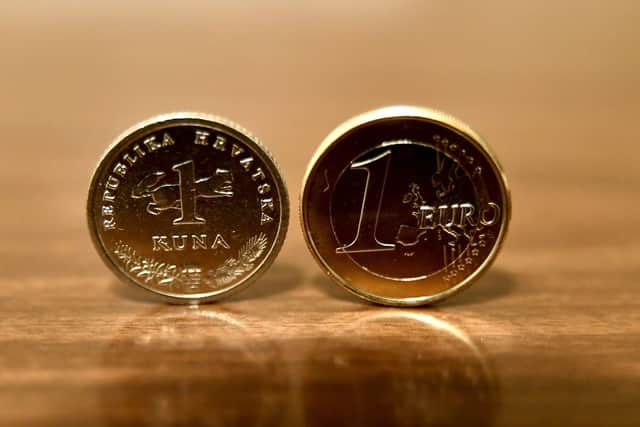What is the currency in Croatia? Why has it joined Euro, what money do you need, is country in Schengen Zone
and live on Freeview channel 276
Known for its crystal clear sea waters, beautiful landscapes and historic cities, Croatia has become one of the most popular tourist destinations for British tourists in recent years.
The country, which is situated across the Adriatic Sea from Italy, has enjoyed a tourism boom thanks to its warm summer temperatures and its role as the background of the hit fantasy series Game of Thrones - not to mention its currency, which has been worth a lot less than the pound.
Advertisement
Hide AdAdvertisement
Hide AdBut the days of cheap holidays in the country could become a thing of the past, as Croatia announced closer ties with the European Union on New Year’s Day 2023. It is the EU’s newest member state, having joined in 2013.
With the UK no longer a member of the EU, it means some key travel information has now changed for those who are set to head off on holidays to Croatia over the coming weeks and months.
So what currency will you need if you’re going on holiday to Croatia - and will you need a visa? Here’s everything you need to know.


Do you need a visa to go to Croatia?
The UK voted to exit the EU in 2016 - a controversial move that led to years of political upheaval. The country formally left the Brussels-based organisation on 31 January 2020.
Advertisement
Hide AdAdvertisement
Hide AdHowever, while the UK is no longer part of it, British tourists enjoy some travel freedoms not open to other non-EU countries. For example, they can access the EU’s visa-free travel zone - known as the Schengen Area - without requiring an entry visa.
The only rules are that you must have a passport to enter the Schengen country in question. You are also only allowed to be in the EU for a maximum of 90 days in any 180-day period.
On New Year’s Day 2023, Croatia joined the Schengen agreement, meaning it now has the same travel rules as countries like France and Spain. The move largely benefits tourists travelling from within the Schengen area itself, as they will now be able to enter Croatia more easily.
To see exactly what rules you have to follow if you are making a trip to Croatia, visit the government website.
What is the currency in Croatia?
Advertisement
Hide AdAdvertisement
Hide AdNot only has Croatia become a member of the Schengen visa-free area, but it has also joined the Eurozone. Its historic 1 January 2023 move fulfils a policy objective the country made upon joining the EU in 2013.
Previously, despite being a European Union member, Croatia did not adopt the Euro currency - instead, it had the Kuna. But it has now adopted the Euro because it will help to shield the country from economic turbulence, such as the current global inflation crisis.


This previous currency was much weaker than the pound, with each pound worth around 8.50 to 9 Kuna. It meant that the cost of hotels, food and drink in the country was much cheaper for British tourists than in the UK itself.
However, the Euro is much closer to parity with the British pound (with each pound tending to be worth between €1.10 to €1.20). It means tourists are less likely to see as much of a difference in prices. But, at the same time, the Euro was much easier to get hold of than Kuna in the UK.
The Euro is now the only legal tender allowed in Croatia, so you won’t be able to use any Kuna you may have picked up during previous holidays to the country.
Comment Guidelines
National World encourages reader discussion on our stories. User feedback, insights and back-and-forth exchanges add a rich layer of context to reporting. Please review our Community Guidelines before commenting.
